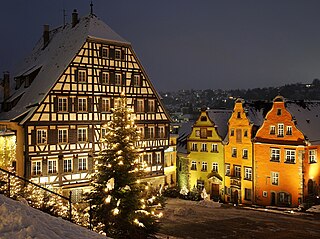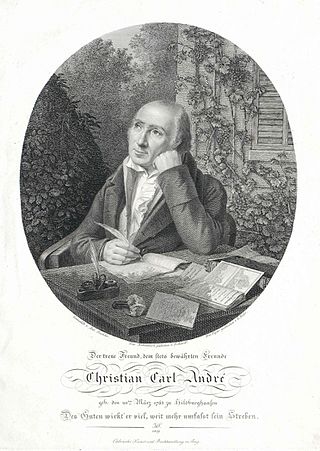
Gregor Johann MendelOSA was an Austrian-Czech biologist, meteorologist, mathematician, Augustinian friar and abbot of St. Thomas' Abbey in Brno (Brünn), Margraviate of Moravia. Mendel was born in a German-speaking family in the Silesian part of the Austrian Empire and gained posthumous recognition as the founder of the modern science of genetics. Though farmers had known for millennia that crossbreeding of animals and plants could favor certain desirable traits, Mendel's pea plant experiments conducted between 1856 and 1863 established many of the rules of heredity, now referred to as the laws of Mendelian inheritance.

Schwäbisch Hall is a city in the German state of Baden-Württemberg located in the valley of the Kocher river, the longest tributary of the Neckar river. The closest larger city is Heilbronn, and Schwäbisch Hall lies north-east of the state capital of Stuttgart. It is the seat of the district (Landkreis) of Schwäbisch Hall.

Schwäbisch Gmünd is a city in the eastern part of the German state of Baden-Württemberg. With a population of around 60,000, the city is the second largest in the Ostalb district and the whole East Württemberg region after Aalen. The city is a Große Kreisstadt since 1956, i.e. a chief city under district administration; it was the administrative capital of its own rural district until the local government reorganisation on 1 January 1973.

Christian Gotthilf Salzmann was a German educational reformer and the founder of the Schnepfenthal institution.

Erich Tschermak, Edler von Seysenegg was an Austrian agronomist who developed several new disease-resistant crops, including wheat-rye and oat hybrids. He was a son of the Moravia-born mineralogist Gustav Tschermak von Seysenegg. His maternal grandfather was the botanist, Eduard Fenzl, who taught Gregor Mendel botany during his student days in Vienna.

Waltershausen is a town in the south-western part of the district of Gotha in the state of Thuringia, Germany.

Schulpforta, otherwise known as Pforta, is a school located in Pforta monastery, a former Cistercian monastery (1137–1540). The school is located near Naumburg on the Saale River in the German state of Saxony-Anhalt.

Eschach is a municipality in the German state of Baden-Württemberg, in Ostalbkreis district.
Ludger Lohmann is a highly acknowledged organist.

Sächsisches Landesgymnasium Sankt Afra zu Meißen is a boarding school for highly gifted students in the German city of Meissen, Saxony. Founded in 1543 as Fürstliche Landesschule and re-established in 2001, the stated aim of the school is to promote the intellectual and social development of highly gifted students. The costs for attending the school comply with the maxim of social balance; the boarding and schooling fees are considerably low in contrast to similar institutions. It is the first publicly funded school for highly gifted students in Germany and is a role model for similar schools.

The Philanthropinum was a reformist, progressive school in Dessau, Germany from 1774 to 1793. It was based on the principles of philanthropinism, an educational movement developed in the German-speaking area during the Age of Enlightenment.

The Internatsschule Schloss Hansenberg (ISH) is a mixed coeducational secondary boarding school in Geisenheim-Johannisberg in the Rheingau in Hesse, Germany.

The Landesgymnasium für Hochbegabte in Schwäbisch Gmünd is a co-educational public Boarding school for highly gifted students founded by the state of Baden-Württemberg. It is the first and sole school of this kind in this state. The Landesgymnasium für Hochbegabte is a publicly funded school in Germany for highly gifted students, similar to the Landesschule Pforta in Saxony-Anhalt, the Landesgymnasium St. Afra in Saxony and Internatsschule Schloss Hansenberg in Hesse. It is funded by the city of Schwäbisch Gmünd, the district Ostalbkreis and the state of Baden-Württemberg. Its stated aim is the promotion of the intellectual and social development of its students.
Günter Altner was a German interdisciplinary active scientist, biologist, Protestant theologian, ecologist, environmentalist, writer and lecturer. Altner had briefly been a professor of human biology at the University of Education Schwäbisch Gmünd, subsequently focussed on theology, his second area of education, and was a professor of protestant theology at the University of Koblenz and Landau for 22 years.

Christian Carl André was a leading 19th century German natural scientist, publisher, economist and educator. He was among the pioneers in the study of heredity whose vision paved the way for the research of Gregor Mendel, the founder of modern genetics.
Pädagogische Hochschule Schwäbisch Gmünd is a public research university located in Schwäbisch Gmünd, Baden-Württemberg, Germany. Founded in 1825 as Pädagogisches Institut Schwäbisch Gmünd, it was transformed into a university in 1962 and now is a part of the Pädagogische Hochschulsystem Baden-Württemberg. It is one out of six such universities in the state of Baden-Württemberg.

Astrid Beckmann is a German physicist, a professor of mathematics and mathematics education, and was a long-serving university president. Beckmann served as president of the Pädagogische Hochschule Schwäbisch Gmünd from 2010 to 2018. She also taught at the University of Ulm.















